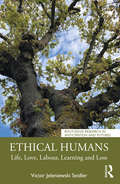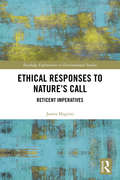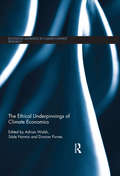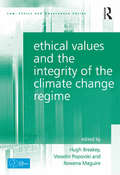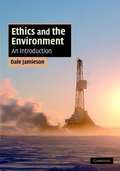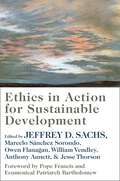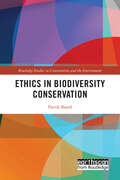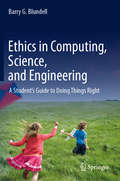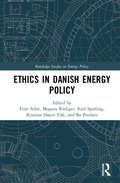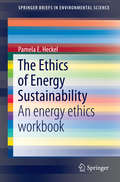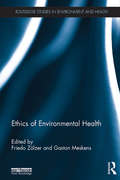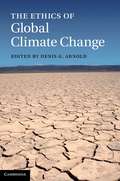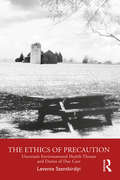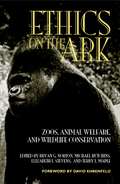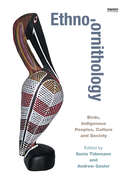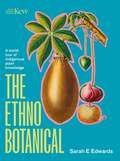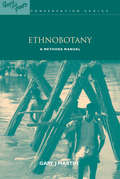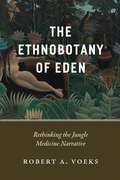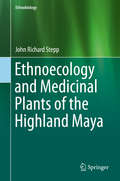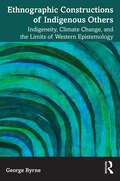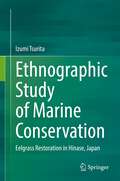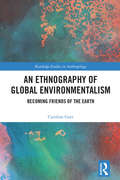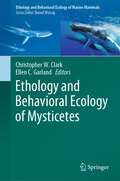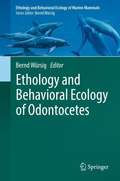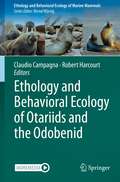- Table View
- List View
Ethical Humans: Life, Love, Labour, Learning and Loss (Routledge Research in Anticipation and Futures)
by Victor Jeleniewski SeidlerEthical Humans questions how philosophy and social theory can help us to engage the everyday moral realities of living, working, loving, learning and dying in new capitalism. It introduces sociology as an art of living and as a formative tradition of embodied radical eco post-humanism. Seeking to embody traditions of philosophy and social theory in everyday ethics, this book validates emotions and feelings as sources of knowledge and shows how the denigration of women has gone hand in hand with the denigration of nature. It queries post-structuralist traditions of anti-humanism that, for all their insights into the fragmentation of identities, often sustain a distinction between nature and culture. The author argues that in a crisis of global warming, we have to learn to listen to our bodies as part of nature and draws on Wittgenstein to shape embodied forms of philosophy and social theory that questions theologies that tacitly continue to shape philosophical traditions. In acknowledging our own vulnerabilities, we question the vision of the autonomous and independent rational self that often remains within the terms of dominant white masculinities. This book offers different modes of self-work, drawing on psychoanalysis and embodied post-analytic psychotherapies as part of a decolonising practice questioning Eurocentric colonising modernity. In doing so it challenges, with Simone Weil, Roman notions of power and greatness that have shaped visions of white supremacy and European colonial power and empire. This book will be of great interest to students and scholars of environmental ethics, environmental philosophy, social theory and sociology, ethics and philosophy, cultural studies, future studies, gender studies, post-colonial studies, Marxism, psychoanalysis and psychotherapy and philosophy and sociology as arts of living.
Ethical Responses to Nature’s Call: Reticent Imperatives (Routledge Explorations in Environmental Studies)
by James MagriniArguing for a renewed view of objects and nature, Ethical Responses to Nature’s Call considers how it is possible to understand our ethical duties - in the form of ethical intuitionalism - to nature and the planet by listening to and releasing ourselves over to the call or address of nature. Blending several strands of philosophical thought, such as Graham Harman’s Object-Oriented Ontology, W. D. Ross’s prima fathics, Alphonso Lingis’s phenomenological ethics traceable to The Imperative, and Michael Bonnett’s ecophilosophy, this book offers a unique rejoinder to the problems and issues that continue to haunt humans’ relationship to nature. The origins of such problems and issues largely remain obscured from view due to the oppressive influence of the "Cultural Framework" which gives form and structure to the ways we understand, discourse on, and comport ourselves in relation to the natural world. Through understanding this "Cultural Framework" we also come to know the responses we continue to offer in answer to nature’s call and address, and are then in a position to analyze and assess those responses in terms of their potential ethical weight. Such a phenomenon is made possible through the descriptive-and-interpretive method of eco-phenomenology. This renewed vision of the human-and-nature provides direction for our interaction with and behavior toward nature in such a way that the ethical insight offers a diagnosis and provides a potentially compelling prescriptive for environmental ills.
The Ethical Underpinnings of Climate Economics (Routledge Advances in Climate Change Research)
by Adrian Walsh Säde Hormio Duncan PurvesDespite their obvious importance, the ethical implications of climate change are often neglected in economic evaluations of mitigation and adaptation policies. Economic climate models provide estimates of the value of mitigation benefits, provide understanding of the costs of reducing emissions, and develop tools for making policy choices under uncertainty. They have thus offered theoretical and empirical instruments for the design and implementation of a range of climate policies, but the ethical assumptions included in the calculations are usually left unarticulated. This book, which brings together scholars from both economics and ethical theory, explores the interrelation between climate ethics and economics. Examining a wide range of topics including sustainability, conceptions of value, risk management and the monetization of harm, the book will explore the ethical limitations of economic analysis but will not assume that economic theory cannot accommodate the concerns raised. The aim in part is to identify ethical shortcomings of economic analysis and to propose solutions. Given the on-going role of economics in government thinking on mitigation, a constructive approach is vital if we are to deal adequately with climate change. This volume will be of great interest to students and scholars of environmental ethics, economics, political science, political philosophy and the philosophy of economics.
Ethical Values and the Integrity of the Climate Change Regime (Law, Ethics and Governance)
by Hugh Breakey Vesselin PopovskiThis book investigates the ethical values that inform the global carbon integrity system, and reflects on alternative norms that could or should do so. The global carbon integrity system comprises the emerging international architecture being built to respond to the climate change. This architecture can be understood as an 'integrity system'- an inter-related set of institutions, governance arrangements, regulations and practices that work to ensure the system performs its role faithfully and effectively. This volume investigates the ways ethical values impact on where and how the integrity system works, where it fails, and how it can be improved. With a wide array of perspectives across many disciplines, including ethicists, philosophers, lawyers, governance experts and political theorists, the chapters seek to explore the positive values driving the global climate change processes, to offer an understanding of the motivations justifying the creation of the regime and the way that social norms impact upon the operation of the integrity system. The collection focuses on the nexus between ideal ethics and real-world implementation through institutions and laws. The book will be of interest to policy makers, climate change experts, carbon taxation regulators, academics, legal practitioners and researchers.
Ethics and the Environment: An Introduction
by Dale JamiesonThis book is an introduction to the philosophical issues involved in this important question, focussing primarily on ethics but also encompassing questions in aesthetics and political philosophy. Topics discussed include the environment as an ethical question, human morality, meta-ethics, normative ethics, humans and other animals, the value of nature, and nature's future.
Ethics in Action for Sustainable Development
by Sachs, Jeffrey D.; Sorondo, Marcelo Sánchez; Flanagan, Owen; Vendley, William; Annett, Anthony; Thorson, JesseThe Sustainable Development Goals, adopted by the United Nations in 2015, comprise an ambitious and sweeping agenda that unites economic, social, and environmental aims. What resources do the world’s religious and secular traditions offer in support of these objectives? Which principles do these traditions hold in common, and how can these shared values help advance global goals?This book presents an in-depth and deeply engaged conversation among interfaith religious leaders and interdisciplinary scholars and practitioners in pursuit of an ethical consensus that could ground sustainable development efforts. Drawing on more than two years of close-knit discussions convened by Jeffrey D. Sachs and Marcelo Sánchez Sorondo, it offers an extensive and inclusive vision of how to promote human flourishing. The book features theological, philosophical, and ethical deliberations of great diversity and depth on the challenges of sustainable development, addressing questions of poverty, environmental justice, peace, conflict, and the future of work. It includes consensus statements on the moral imperatives of sustainable development, introductions to seven major religious traditions and their conceptions of the common good, and thematic reflections. Wide-ranging and urgent, this book represents a major contribution to interreligious dialogue and to the articulation of a shared global ethics.The book features a foreword by Pope Francis and Ecumenical Patriarch Bartholomew.
Ethics in Biodiversity Conservation (Routledge Studies in Conservation and the Environment)
by Patrik BaardThis book examines the role of ethics and philosophy in biodiversity conservation. The objective of this book is two-fold: on the one hand it offers a detailed and systematic account of central normative concepts often used, but rarely explicated nor justified, within conservation biology. Such concepts include ‘values’ (both intrinsic, instrumental, and, more recently, relational), ‘rights’, and ‘duties’. The second objective is to emphasize to environmental philosophers and applied ethicists the many interesting decision-making challenges of biodiversity conservation. The book argues that a nuanced account of instrumental values provides a powerful tool for reasoning about the values of biodiversity. It also scrutinizes relational values, the concept of rights of nature, and risk, and show how moral philosophy proves indispensable for these concepts. Consequently, it engages with recent suggestions on normative aspects of biodiversity conservation, and show the need for moral philosophy in biodiversity conservation. The overriding aim of this book is to provide conservation biologists and policy-makers with a systematic overview of concepts and assessments of the reasons for reaching prescriptive conclusions about biodiversity conservation. This will prove instrumental in clarifying the role of applied ethics and a refined understanding of the tools it can provide. This title will be of interest to students and scholars of conservation biology, conservation policy, environmental ethics and environmental philosophy.
Ethics in Computing, Science, and Engineering: A Student’s Guide to Doing Things Right
by Barry G. BlundellThis comprehensive textbook introduces students to the wide-ranging responsibilities of computing, science and engineering professionals by laying strong transdisciplinary foundations and by highlighting ethical issues that may arise during their careers. The work is well illustrated, and makes extensive use of both activities, and ethical dilemmas which are designed to stimulate reader engagement. A number of memorable case studies are also included and frequently draw on the demanding aerospace industry. The book adopts a strongly human centric approach, with matters such as privacy erosion and censorship being viewed not only in their current context but also in terms of their ongoing evolution. What are our individual ethical responsibilities for ensuring that we do not develop for future generations a technological leviathan with the potential to create a dystopian world? A broad range of technologies and techniques are introduced and are examined within an ethical framework. These include biometrics, surveillance systems (including facial recognition), radio frequency identification devices, drone technologies, the Internet of Things, and robotic systems. The application and potential societal ramifications of such systems are examined in some detail and this is intended to support the reader in gaining a clear insight into our current direction of travel. Importantly, the author asks whether we can afford to allow ongoing developments to be primarily driven by market forces, or whether a more cautious approach is needed. Further chapters examine the benefits that are associated with ethical leadership, environmental issues relating to the technology product lifecycle (from inception to e-waste), ethical considerations in research (including medical experimentation involving both humans and animals), and the need to develop educational programs which will better prepare students for the needs of a much more fluid employment landscape. The final chapter introduces a structured approach to ethical issue resolution, providing a valuable, long-term source of reference. In addition it emphasises the ethical responsibilities of the professional, and considers issues that can arise when we endeavour to effect ethically sound change within organisations. Examples are provided which highlight the possible ramifications of exercising ethical valour. The author has thus created an extensively referenced textbook that catalyses student interest, is internationally relevant, and which is multicultural in both its scope and outlook.
Ethics in Danish Energy Policy (Routledge Studies in Energy Policy)
by Finn Arler Mogens Rüdiger Karl Sperling Kristian Høyer Toft Bo PoulsenThis book deepens our understanding of ethical drivers in energy policy and contributes to future decision-making on transitions towards a sustainable energy system. During the latest fifty years Western energy politics have been faced with a series of ethical challenges including rapid growth, oil crises, security of supply, nuclear power and climate change. Combining philosophical, historical and planning approaches into one narrative, these dilemmas are explored using Denmark as the key case study. Drawing on contributions from several experts in the field, the ethics of energy is investigated from multiple perspectives at the individual, corporate, local and national levels, focusing on concrete decisions where different ethical considerations are weighted against each other. This comprehensive approach helps to gain a deeper understanding of the energy sector’s history and gives important input to its future layout. Drawing comparisons with European and global examples, this book will be of great interest to students and scholars of energy politics and policy, environmental ethics, climate change and sustainability transitions.
The Ethics of Energy Sustainability
by Pamela E. HeckelThis book is an easy to use instructional aide. Explore sustainability issues in contemporary society through a transdisciplinary approach. Chapters include ethics, public resources, public policy, combustion, heat exchangers, nuclear, solar, water, and wind energy. A short summary is presented for each topic, followed by additional topics for research, assignments, and references. The complex assignments require students to grow in their professional judgment.
Ethics of Environmental Health (Routledge Studies in Environment and Health)
by Friedo Zölzer Gaston MeskensEnvironmental health encompasses the assessment and control of those environmental factors that can potentially affect human health, such as radiation, toxic chemicals and other hazardous agents. It is often assumed that the assessment part is just a matter of scientific research, and the control part a matter of implementing standards which unambiguously follow from that research. But it is less commonly understood that environmental health also requires addressing questions of an ethical nature. How can we determine the "acceptable" risk level for the general population or for certain groups? How should we deal with uneven distributions of risks and benefits? How do we communicate about risks with the stakeholders? This multidisciplinary collection brings together a number of leading researchers and scholars in order to generate discussion surrounding these key questions, and to bring the ethical implications of science and technology to the forefront of critical thought. Providing a broad overview of the Ethics of Environmental Health, its philosophical foundations and practical applications, this book offers a significant contribution to ongoing discussions in sustainable development and will be of interest to scholars and practitioners of Environmental Health, urban studies and healthcare.
The Ethics of Global Climate Change
by Denis G. ArnoldGlobal climate change is one of the most daunting ethical and political challenges confronting humanity in the twenty-first century. The intergenerational and transnational ethical issues raised by climate change have been the focus of a significant body of scholarship. In this new collection of essays, leading scholars engage and respond to first-generation scholarship and argue for new ways of thinking about our ethical obligations to present and future generations. Topics addressed in these essays include moral accountability for energy consumption and emissions, egalitarian and libertarian perspectives on mitigation, justice in relation to cap and trade schemes, the ethics of adaptation and the ethical dimensions of the impact of climate change on nature.
The Ethics of Precaution: Uncertain Environmental Health Threats and Duties of Due Care
by Levente SzentkirályiThere are thousands of substances manufactured in the United States to which the public is routinely exposed and for which toxicity data are limited or absent. Some insist that uncertainty about the severity of potential harm justifies implementing precautionary regulations, while others claim that uncertainty justifies the absence of regulations until sufficient evidence confirms a strong probability of severe harm. In this book, Levente Szentkirályi overcomes this impasse in his defense of precautionary environmental risk regulation by shifting the focus from how to manage uncertainty to what it is we owe each other morally. He argues that actions that create uncertain threats wrongfully gamble with the welfare of those who are exposed and neglect the reciprocity that our equal moral standing demands. If we take the moral equality and rights of others seriously, we have a duty to exercise due care to strive to prevent putting them in possible harm’s way. The Ethics of Precaution will be of great interest to researchers, educators, advanced students, and practitioners working in the fields of environmental political theory, ethics of risk, and environmental policy.
Ethics on the Ark: Zoos, Animal Welfare, and Wildlife Conservation
by Terry Maple Elizabeth Stevens Michael Hutchins Bryan G. NortonEthics on the Ark presents a passionate, multivocal discussion--among zoo professionals, activists, conservation biologists, and philosophers--about the future of zoos and aquariums, the treatment of animals in captivity, and the question of whether the individual, the species, or the ecosystem is the most important focus in conservation efforts. Contributors represent all sides of the issues. Moving from the fundamental to the practical, from biodiversity to population regulation, from animal research to captive breeding, Ethics on the Ark represents an important gathering of the many fervent and contentious viewpoints shaping the wildlife conservation debate.From the Trade Paperback edition.
Ethno-ornithology: Birds, Indigenous Peoples, Culture and Society
by Sonia Tidemann Andrew GoslerIndigenous knowledge that embraces ornithology takes in whole social dimensions that are inter-linked with environmental ethos, conservation and management for sustainability. In contrast, western approaches have tended to reduce knowledge to elemental and material references. This book looks at the significance of indigenous knowledge of birds and their cultural significance, and how these can assist in framing research methods of western scientists working in related areas. As well as its knowledge base, this book provides practical advice for professionals in conservation and anthropology by demonstrating the relationship between mutual respect, local participation and the building of partnerships for the resolution of joint problems. It identifies techniques that can be transferred to different regions, environments and collections, as well as practices suitable for investigation, adaptation and improvement of knowledge exchange and collection in ornithology. The authors take anthropologists and biologists who have been trained in, and largely continue to practise from, a western reductionist approach, along another path - one that presents ornithological knowledge from alternative perspectives, which can enrich the more common approaches to ecological and other studies as well as plans of management for conservation.
The Ethnobotanical: A world tour of Indigenous plant knowledge
by Dr Sarah EdwardsSince the beginning of humanity's existence, plants have provided us with everything we need for our survival - they sustain us with air to breathe, food to eat, materials to make clothes and shelter with, and medicine to treat and prevent disease. Their beauty can also enhance our mood and provide spiritual and emotional nourishment.Western science has 'discovered' and named innumerable plant species over the course of its colonial history. To many Indigenous peoples, however, plants have been recognised for centuries as sentient beings, imbued with spirit and agency to help humanity. Publishing in partnership with the Royal Botanic Gardens at Kew, The Ethnobotanical offers a unique and beautiful perspective on plants and their roles in the lives of peoples from across the planet.
Ethnobotany: A Methods Manual (People and Plants International Conservation)
by Gary J. MartinEthnobotany, the study of the classification, use and management of plants by people, draws on a range of disciplines, including natural and social sciences, to show how conservation of plants and of local knowledge about them can be achieved. Ethnobotany is critical to the growing importance of developing new crops and products such as drugs from traditional plants. This book is the basic introduction to the field, showing how botany, anthropology, ecology, economics and linguistics are all employed in the techniques and methods involved. It explains data collection and hypothesis testing and provides practical ideas on fieldwork ethics and the application of results to conservation and community development. Case studies illustrate the explanations, demonstrating the importance of collaboration in achieving results. Published with WWF, UNESCO and Royal Botanic Gardens Kew.
The Ethnobotany of Eden: Rethinking the Jungle Medicine Narrative
by Robert A. VoeksIn the mysterious and pristine forests of the tropics, a wealth of ethnobotanical panaceas and shamanic knowledge promises cures for everything from cancer and AIDS to the common cold. To access such miracles, we need only to discover and protect these medicinal treasures before they succumb to the corrosive forces of the modern world. A compelling biocultural story, certainly, and a popular perspective on the lands and peoples of equatorial latitudes—but true? Only in part. In The Ethnobotany of Eden, geographer Robert A. Voeks unravels the long lianas of history and occasional strands of truth that gave rise to this irresistible jungle medicine narrative. By exploring the interconnected worlds of anthropology, botany, and geography, Voeks shows that well-intentioned scientists and environmentalists originally crafted the jungle narrative with the primary goal of saving the world’s tropical rainforests from destruction. It was a strategy deployed to address a pressing environmental problem, one that appeared at a propitious point in history just as the Western world was taking a more globalized view of environmental issues. And yet, although supported by science and its practitioners, the story was also underpinned by a persuasive mix of myth, sentimentality, and nostalgia for a long-lost tropical Eden. Resurrecting the fascinating history of plant prospecting in the tropics, from the colonial era to the present day, The Ethnobotany of Eden rewrites with modern science the degradation narrative we’ve built up around tropical forests, revealing the entangled origins of our fables of forest cures.
Ethnoecology and Medicinal Plants of the Highland Maya (Ethnobiology Ser.)
by John Richard SteppPlants play a central role in human existence. Medicinal plants, in particular, have allowed for the continued survival of the human species. This book, based on over a decade of research in Southern Mexico with the Highland Maya, explores the relationship between medicinal plants, traditional ecological knowledge and the environment. The biodiversity of the region remains among the highest in the world, comprising more than 9000 plant species. Over 1600 employed for medicinal uses and knowledge for approximately 600 species is widespread. Medicinal plants play an overwhelmingly primary role in the daily health care of the Highland Maya. Three principal objectives are addressed: 1) identifying which medicinal plants are used; 2) determining the role of environmental variation on use and selection of medicinal plants; and 3) identifying which habitats are preferred for medicinal plant procurement. Findings demonstrate the overwhelming importance of human modified environments for medicinal plants. Explanations are presented from human ecology and biochemical ecology. Implications for conservation, health and the environment are discussed.
Ethnographic Constructions of Indigenous Others: Indigeneity, Climate Change, and the Limits of Western Epistemology
by George ByrneThis book examines the ways in which indigeneity interacts with climate change politics at multiple levels and at the same time offers a self-critical reflection on the role of ethnographic research (and researchers) in this process. Through a multi-sited ethnography, it shows how indigeneity and climate change mitigation are at this point so intensely intertwined that one cannot be clearly understood without considering the other. While indigenous identities have been (re)defined in relation to climate change, it argues that Indigenous Peoples continue to subvert pervasive notions of the nature/culture dichotomy and disrupt our understanding of what it means to be human in relation to nature. It encourages students and researchers in anthropology, international development, and other related fields to engage in more meaningful reflection on the epistemic shortcomings of “the West”, including in our own research, and to acknowledge the ongoing role of power, coloniality, extractivism, and whiteness in climate change discourses.
Ethnographic Study of Marine Conservation: Eelgrass Restoration in Hinase, Japan
by Izumi TsuritaThis book explores the nature of marine conservation based on the case study of Hinase, a fishing village in Okayama, Japan. It focuses on the fishers’ self-motivated eelgrass restoration activity which has been continued for more than 30 years. This activity in Hinase recently attracted international attention as a case under the name “Satoumi” and “Marine Protected Areas” in several governmental reports, but detailed information, such as the historical background and social structure of Hinase, has not yet been analyzed. This book, therefore, fulfills this gap by providing its ethnographic information. In addition, this book offers some points for critical thinking by concluding that marine conservation activities cannot always be evaluated or arranged under the standardized approach with limited time and space. This viewpoint reaffirms the importance of local initiative and highlights the value of qualitative research to seek the way forward for promising marine conservation. This book is suitable for an academic audience in the field of social sciences, such as applied anthropology, as well as ecologists, government officials, environmentalists, and citizens who are interested or engaged in environmental issues or natural resource management.
An Ethnography of Global Environmentalism: Becoming Friends of the Earth (Routledge Studies in Anthropology)
by Caroline GattBased on nine years of research, this is the first book to offer an in-depth ethnographic study of a transnational environmentalist federation and of activists themselves. The book presents an account of the daily life and the ethical strivings of environmental activist members of Friends of the Earth International (FoEI), exploring how a transnational federation is constituted and maintained, and how different people strive to work together in their hope of contributing to the creation of "a better future for the globe." In the context of FoEI, a great diversity of environmentalisms from around the world are negotiated, discussed and evolve in relation to the experiences of the different cultures, ecosystems and human situations that the activists bring with them to the federation. Key to the global scope of this project is the analysis of FoEI experiments in models for intercultural and inclusive decision-making. The provisional results of FoEI’s ongoing experiments in this area offer a glimpse of how different notions of the environment, and being an environmentalist, can come to work together without subsuming alterity.
Ethology and Behavioral Ecology of Mysticetes (Ethology and Behavioral Ecology of Marine Mammals)
by Christopher W. Clark Ellen C. GarlandIn this book, an international team of leading marine mammal scientists, with a remarkably diverse set of backgrounds and areas of expertise, lead you through a synthesis of current knowledge on baleen whales. Baleen whales are the largest animals ever to have lived on this planet. They also have the lowest and most intense voices on Earth, most likely evolved to take advantage of ocean acoustic transmission conditions so as to be detectable across ocean basins. Some baleen whales can live to be 150-200 years old. They migrate many thousands of kilometers between feeding and breeding areas. They produce songs and calls that serve as behavioral foundations for establishing, maintaining and expanding their cultural identities. To conclude that we know the behavioral limits of these large brained, long-lived animals would be naïve. As baleen whale scientists, we are still beginning to comprehend the enormous complexities and natural histories of these remarkable animals.Today, the fact that whales sing is known throughout much of the world. This awareness started 50 years ago with the publication and popularization of a collection of humpback song recordings that motivated research into baleen whale behavioral ethology. In this book’s chapters, a reader’s experiences will stretch from learning about baleen whale laryngeal anatomy associated with their different voices to learning about the vast ocean areas over which their voices can be heard and the emerging complexities of their culturally defined societies. These are accompanied by chapters on the fundamental ethological contexts of socializing, migrating, and foraging. Two common themes permeate the book. One theme highlights the phenomenal increase in scientific knowledge achieved through technological advancements. The other theme recognizes the impacts of human-made activities on ocean acoustic environments and the resultant influences on the health and survival of individual whales and their populations. Although the book is intentionally ambitious in its scope, as scientists, we fully recognize that baleen whale science is still in its infancy. Many profound revelations await discovery by cohorts of young, multi-talented explorers, some of whom are stretching their wings in this volume and some of whom are reading these scientific stories for the first time.
Ethology and Behavioral Ecology of Odontocetes (Ethology and Behavioral Ecology of Marine Mammals)
by Bernd WürsigThis book concentrates on the marine mammalian group of Odontocetes, the toothed whales, dolphins, and porpoises. In 23 chapters, a total of 40 authors describe general patterns of ethological concepts of odontocetes in their natural environments, with a strong bent towards behavioral ecology. Examples are given of particularly well-studied species and species groups for which enough data exist, especially from the past 15 years. The aim is to give a modern flavor of present knowledge of ethology and behavior of generally large-brained behaviorally flexible mammals that have evolved quite separately from social mammals on land. As well, the plight of populations and species due to humans is described in multiple chapters, with the goal that an understanding of behavior can help to solve or alleviate at least some human-made problems.
Ethology and Behavioral Ecology of Otariids and the Odobenid (Ethology and Behavioral Ecology of Marine Mammals)
by Claudio Campagna Robert HarcourtThis book is focused on the marine mammalian groups the Otariidae and the Odobenidae, otherwise known as fur seals, sea lions and the walrus. In 30 chapters, more than 60 authors from 30 institutions and 13 nationalities, discuss a broad suite of topics from maternal care and mating behavior, through play, cognition and personality, to adaptation to life in the Anthropocene. The authors explore the behaviors that have allowed these semi-aquatic mammals to thrive in the marine realm. Many populations have recovered following historical decimation, with interesting evolutionary consequences which are explored. Detailed, selected, individual species descriptions are also provided, showcasing the behavioral diversity of this engaging, adaptive and highly successful group of marine mammals.
